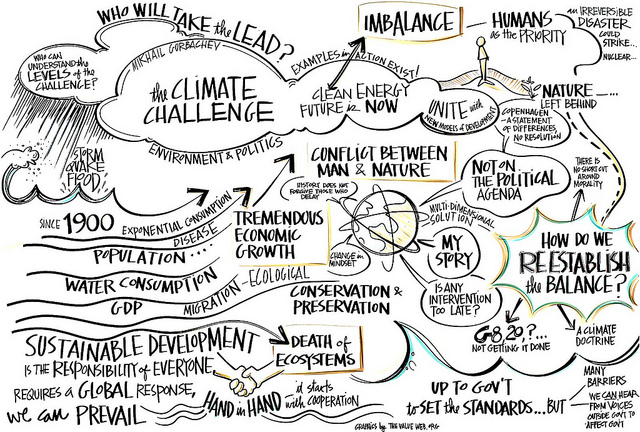
The climate crisis has already claimed hundreds of thousands of human lives and has caused tremendous suffering for millions more.
We know what the solutions are, but humanity has not yet developed the will to act as a collective and safeguard the long-term survival of our species. Without an expanded definition of “self,” at the level of a critical mass of individuals, I simply don’t think that it is going to happen.
Consider the 2015 United Nations Climate Change Conference that will be taking place at the end of this year in Paris.
We are hoping that this time, the world will come together like never before, with unprecedented cooperation and determination, to reach a binding deal that prevents climate change from becoming unbearably worse. But every single barrier to successful negotiations can be boiled down to a single root cause—our perceived self-interests. Weighing the political consequences, our leaders are a reflection of our collective values and tend to act from a place of self-preservation. They fear the loss of material wealth, comparative economic advantage and sovereignty.
That’s not compatible with successful climate negotiations.
It is human nature to be self-interested.
It’s our definition of “self” that changes everything. As a visible minority who was born and raised in Canada, I have never before had the experience of being in a place where everyone looks similar to me, until I visited India for the first time a few years ago. One day, while in our air-conditioned tour bus, I heard a soft knock on the window. I looked down and saw a little boy selling peanuts. In an ideal world, he would have been at school instead of in the streeets. The sight of him, and the expression on his face, tugged at my heart strings. It’s not surprising that I would have reacted that way, but it was surprising that the tug was stronger in comparison to when similar things had happened in the past.
It occurred to me that the difference this time around was that this child actually looked like me and could have passed as my own. Perhaps at a subconscious level, that observation caused me to feel greater empathy for him, relative to the others. How absurd that superficial characteristics such as skin color and facial features would cause me to see more of “myself” in this child.
That wouldn’t have been the case if I had a broader definition of self.
Similarly, the climate negotiations will be far more successful if we could feel strong empathy for all children, and not just the ones with similar DNA. In other words, the will to act as a collective will only be generated when we have an expanded definition of “self.”
So who are we, really?
I recently did a guided meditation to help explore this subject. My resulting stream of consciousness went something like this:
I have an arm, but I don’t feel like I am my arms. I have eyes, but I don’t feel like I am my eyes. So then what am I?
I must be my mind.
Where is my mind located? It is inside my skull—it is my brain—where all my thoughts are generated.
Does that mean that I am my brain?
My brain is made up of matter, which consist of particles, which consist of smaller particles, which consist of waves of energy, holding these tiny particles together in a specific, but impermanent structure. My brain ultimately consists of the same source materials as my arms, and will eventually decompose just like my arms.
If I am not my arms, how am I my brain? It seems strange to think that there is more of “me” in my brain than there is in my arms. Both are simply parts of a body that is made up of matter, just like a table, a leaf, an airplane and a glass. All of these things are impermanent structures.
So then where and what the heck am I? Maybe I am much more than what I think I am.
I don’t really know where this exploration will go, but it is enough to make me want to continue questioning my definition of self. I have a feeling that as we humans get clearer on who we really are, the state of humanity will shift in ways that we can’t comprehend.
I can’t prove this for those who believe that logic is the only way to truly understand the world around us, nor will I try. It’s simply a feeling inside me. The one thing I do feel certain of, is that individualism and materialism are huge barriers to bringing about the transformational shifts that need to occur for our own survival on this planet.
It starts with getting over ourselves.
Many environmentalists, myself included, often feel disappointed and frustrated with people who seem obsessed with packaging their lives for social media and selfies, home renovations, cars, weddings, baby showers, getting their nails done, getting rich and increasing their social status. Relative to us, they seem to be a lot more individualistic, materialistic, shallow and egotistical. Even worse are those who exploit others, in some cases millions of people, for their own materialistic gain.
But if we are really honest with ourselves, we will admit how much our own ego gets in the way, every single day.
Every time we measure ourselves against others (even secretly—especially secretly), every time we crave praise, or being perceived as the smartest or most influential in the bunch, every time we are rattled by criticism directed at us, every time we feel the need to create a narrative about our lives, we are acting from the exact same place as the people we think we don’t identify with.
I’ve realized that people in the environmental movement are not at all different from those in the private sector when it comes to the size of our egos. We just measure ourselves using a different currency. Instead of money and organizational hierarchy, the currency of “ego” in our sector is intelligence, influence and respect.
It is tricky, because in most cases, we do actually need to be perceived as having these qualities if we are going to successfully bring about the changes that we are all working toward.
Of course we’re all passionate about, and motivated by positive change.
But we need to admit that somewhere along the journey, we often become addicted to the short-lived, warm and fuzzy feelings we get when others reflect back to us that we are more intelligent, influential and respected than average.
Somewhere along the way, the need to continue feeling “special” relative to others often overpowers our original focus on change.
As an environmental movement, our effectiveness will grow exponentially when our individual egos start to dissolve.
Organizations and campaigners will be quicker to realize and adjust when they’ve bet on the wrong strategy or tactic. We will focus our limited resources on activities that actually have an impact on the outside world, rather than simply doing the things that make us feel smart and are within our comfort zone. Blind spots will clear up more quickly, or not even form in the first place.
People will be more willing to take smart risks because their self-worth will no longer be wrapped up in whether they succeed or fail. Decision making will become far more strategic because it will no longer subconsciously begin with “what does this mean about my identity and my self-worth?” It will instead begin with, “what is this situation calling for?”
Our movement has come a long way. Imagine how much faster we will travel without the crushing weight of our egos. As we push for environmental wins, let’s remember that this is about even more than avoiding future catastrophes and safeguarding human survival. It is also about our own evolution toward a happier, more liberated society.
That will become much easier when we learn to get over ourselves.
~
Relephant read:
Can Climate Science Still Be Ignored?
~~
Author: Devika Shah
Editor: Ashleigh Hitchcock
Photo: flickr/The Value Web










Read 3 comments and reply